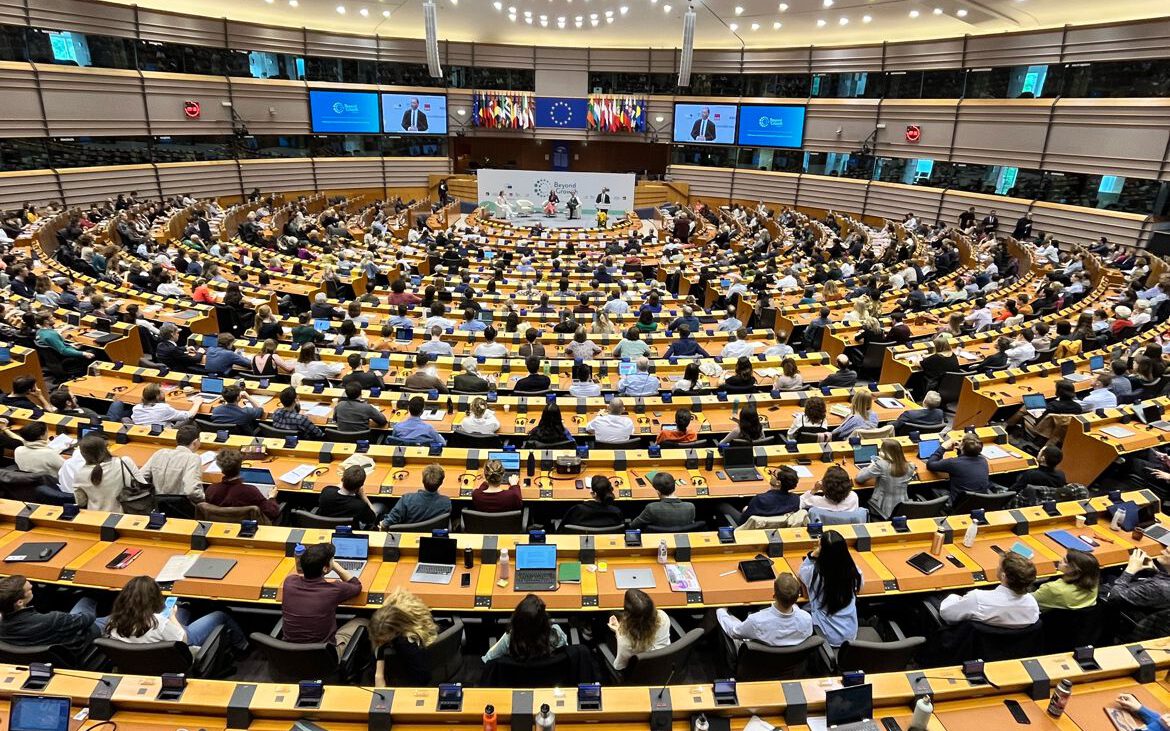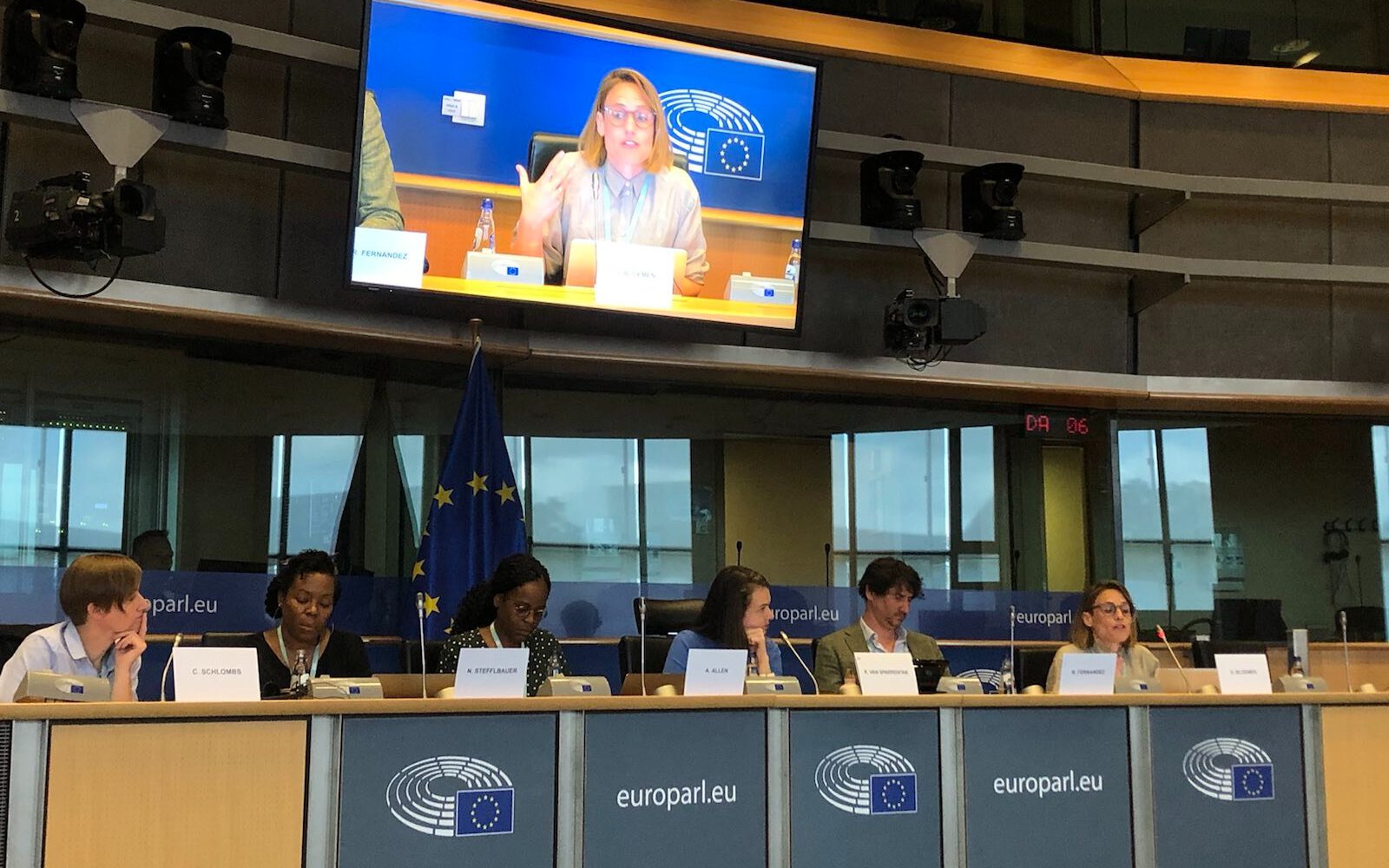From the 15th till the 17th of May a landmark conference on post-growth took place in the European Parliament, organized by twenty members of the European Parliament (MEPs) representing five different political groups alongside trade unions and civil society organizations across Europe. The conference welcomed major thought leaders such as Jason Hickel, Joseph Stigilitz and Kate Raworth as well as representatives of trade unions, civil society and academics. For three days, all engaged with the European policy environment to explore how post-growth strategies can help us out of today’s intertwined social and ecological crises. As a contributing partner in the conference, Commons Network co-organized several events including one panel on what a postgrowth transition means for the digital sphere.

We had an inspiring discussing covering many issues with an amazing panel and participants from the audience. CN Director Sophie Bloemen gave an opening talk. Below, you can find a full transcript of Sophie’s 10min keynote. You also watch the full recordings of the panel here. Other speakers were:
- Kim Van Sparrentak – MEP (Greens/EFA), Beyond Growth Conference organiser
- Rodrigo Fernandez – Senior researcher at SOMO and author of the report “Financialisation of Big Tech”
- Corinna Schlombs – Associate Professor of History at Rochester Institute of Technology
- Asha Allen – Advocacy Director for Europe, Online Expression & Civic Space at the Centre of Democracy and Technology
- Nakeema Stefflbauer – CEO, FrauenLoop and Core Participant, Decolonising Digital Rights
Sophie’s talk:
When we talk about a different economy, about an economy that serves both people and the planet, we have to consider the implications for the digital realm. Because our economy is digital now. We communicate through computers. Data is the raw material.
This digital transition has come with many opportunities – for communication, for information sharing, for access to knowledge. But it also comes with tremendous challenges. Such as surveillance and the commodification of our daily lives as well as increasing societal and economic power imbalances. But also challenges to our ecological environment. Contrary to the optimism often voiced with regards to the opportunities of digitalisation for ‘greening’ the economy – the ecological footprint of the digital realm is huge.
And the digital economy does not only concern data, data processing and algorithms – it provides the infrastructure of our economy. Who controls and owns the infrastructure is crucial. Think of bridges, roads, pipelines and basic services like education, and housing. These are all public goods we’d like to govern democratically. In the digital realm this is far from the case.
Technology: in function of capitalism
Technology is in line with the logic of the incumbent system, which at present is the capitalist logic of accumulation and growth. So the purpose of technological innovation – which is almost used as a synonym for digital innovation nowadays – is to increase productivity to foster economic growth. It reinforces and accelerates the logic of growth, accumulation and therewith extractivism.
During the rest of the conference, the negative effects of today’s economic system on the environment, our wellbeing and social equality are made very clear. I will build on that, and merely point out the main ways in which digital technology is currently exacerbating these dynamics.
Firstly, platformization and relational logics: Our lives are increasingly organised around a few mega companies, defining the way we work, love, play, and communicate. This infiltration into the different spheres of our lives has accelerated the hegemony of the logic of the market, of commodification and competition. This has had the effect of marginalising and replacing other relational dynamics, such as that of cooperation, solidarity, and care. Replacing these with a transactional logic. Just think about the way Airbnb has made us all hoteliers, instead of sharing our houses with friends or family when visiting town.
Secondly, the extractavist practices that are integral to the capitalist system, which has long been clear in labour relations and colonial structures, are being revamped as it were. The effects on labour by the extractive practices that digital technology allows for are extraordinary. The gains we have made with socialist and social democratic policies to protect labour are to a large extent made undone by the digital realm and platform’s disregard for workers’ rights. These gig economy workers do not have access to unions or normal labour contracts. Thankfully, there is quite some pushback on this, also from this House.
A third point is the enormous burden the digital economy represents to our planet. The cloud is not really in the cloud, but in massive data centers, physically absorbing huge amounts of energy, often fossil fuelled. The world’s data centres consume about three per cent of the global electricity supply, producing two per cent of global greenhouse emissions – roughly the same as global air travel. Planned obsolescence in the design of digital devices like our smartphones creates massive physical waste and a demand for rare earth materials. The mining for Lithium and other critical minerals is leading to huge ecological damage in countries like China but also Bolivia and Chile. The digital transition in this sense is playing out along colonial lines: extraction of raw materials in the South for the consumption needs of the North. But also through our trade agreements we are seeing data extractivism happening in a neocolonial manner: first the extraction of raw material by the North – in this case data- , and then selling back the technology to these countries.
Lastly, the digital economy is greatly adding to the centralisation of the economy: a few Big Tech companies are providing much of our services and are increasingly in control of infrastructures. Not only in a physical sense (think for example about fibre cables), but also online, Meta – formerly Facebook of course – and Twitter – which has now also succumbed to the wishes of capital – provide our forums for public debate. Big Tech provides our communication channels, our education tools, the channels for public media to reach their audiences and the intermediary for the government to reach the broader public. This has an effect on our democracy, and our capacity for self determination. It takes away the digital sovereignty of communities.

Digital infrastructures in the common interest
How can we start governing our digital infrastructures and supply chains in the common interest instead of the interest of capital? What are the necessary changes for social-ecologically sustainable business models and infrastructures with a fair distribution? These are the questions I was asked to answer.
Part of the answer is posing another question, namely: how do we make sure the logic of growth does not dominate the digital environment and therewith our economies and societies? For this, we have to move towards alternatives. What do they look like?
Just as we need public and civic spaces offline, we need them online. We need to have the spaces for these logics of social relation other than the transactional logic of financialised markets. Spaces which allow for cooperation, care, and sharing. Spaces where we can enjoy self determination, privacy and democracy. Where not every click is commodified and we are not targets for commercial or political manipulation.
We need alternatives that:
- Create public value, by empowering public institutions and the commons
- Increase the digital sovereignty of communities and societies
- Adhere to democratic and collective forms of governance.
- Use open standards and embrace interoperability as a design principle
- Be based on free and open-source software
- Ensure privacy by default and by design
- And contribute to regenerative business models that add value and are sustainable in the long run while strengthening local economies
Some of these digital spaces are already here or in active development: think of PeerTube, and ActivityPub, in the standards they use. And federated and decentralised solutions such as Mastodon. Collaborative peer production and democratic stewardship have proven their potential through for example Linux, Apache or Wikipedia – a huge knowledge commons we all benefit from.
What holds promise for new forms of governance and ownership are data commons and data cooperatives. These models offer ways to implement democratic governance and business models which are not based on extraction. Data commons have long been used in research as a way to pool and steward information in a collaborative and democratic way. The European Commission has already built on this idea with its Open Science Cloud. Data cooperatives such as health data coops are starting to pop up as a way for people or organisations to manage their data in the common and public interest.
Another promising development is that of platform cooperatives. As alternatives to current platforms, platform coops are often community-based and stimulate the local economy, while using open-source software. There are delivery platforms such COOPCYCLE, care provision, energy coops using data commons technology, and many more.
What the EU and its Member States can do
Europe has to regulate yes – and advances have been made with the data services act, the data governance act and hopefully the platform directive. But crucially, Europe also has to actively co-create the economy we want to see.
Building Digital Public Spaces that can function as alternatives for the centralised, dominant commercial platforms of today must be at the core of the European Union’s digital policies in the coming years.
We talk about China, and the US and then the European model. But what does this look like? The aim should not be to facilitate the creation of another dominant platform, a European one, which would then operate under the existing rules of the game while relying on the same exploitative business models.
Importantly, fostering a different architecture of the digital space requires engaging with a variety of actors – which are not only commercial but also public and civic in nature. People need to be able to have a voice in how digital technology is being shaped.
To create more socially-oriented and ecologically sustainable digital spaces and ensure the sovereignty of communities and our societies as a whole, Europe needs to invest in digital commons and public digital infrastructures. The need for transformative investment is evident in the domains of education and science, public service media, care, and in our economy overall.
Europe has a strong history of public institutions providing services and infrastructure. It should continue building these also in the digital realm, as the EU has done with Europeana and the European Open Science Cloud.
In 2022, the Commission, the Parliament and the Council signed the European Declaration on Digital Rights and Principles for the Digital Decade. This ambitious declaration mentions many of the things above, but up to now what is the lacking are concrete plans, and the understanding that it’s about the economy. Fostering these approaches and regenerative ways of production requires not only investing in ‘human centered technology’ as it is referred to now, but also in this other democratic and cooperative economy of sufficiency itself.
So, to conclude, if we want to move to an economy which operates within the ecological limits of the planet and creates wellbeing for all, we have to take the digital into account as the economy is now digital.
My agenda today, is for the postgrowth crowd to look more at the digital and for the digital crowd to look more at postgrowth. Hopefully this conversation will contribute to this.

Watch the full recordings of the full panel here
 ☰
☰